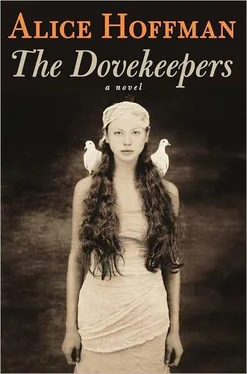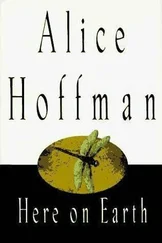Alice Hoffman - The Dovekeepers
Здесь есть возможность читать онлайн «Alice Hoffman - The Dovekeepers» весь текст электронной книги совершенно бесплатно (целиком полную версию без сокращений). В некоторых случаях можно слушать аудио, скачать через торрент в формате fb2 и присутствует краткое содержание. Год выпуска: 2011, ISBN: 2011, Жанр: Историческая проза, на английском языке. Описание произведения, (предисловие) а так же отзывы посетителей доступны на портале библиотеки ЛибКат.
- Название:The Dovekeepers
- Автор:
- Жанр:
- Год:2011
- ISBN:978-1-4516-1749-8
- Рейтинг книги:2.5 / 5. Голосов: 2
-
Избранное:Добавить в избранное
- Отзывы:
-
Ваша оценка:
- 60
- 1
- 2
- 3
- 4
- 5
The Dovekeepers: краткое содержание, описание и аннотация
Предлагаем к чтению аннотацию, описание, краткое содержание или предисловие (зависит от того, что написал сам автор книги «The Dovekeepers»). Если вы не нашли необходимую информацию о книге — напишите в комментариях, мы постараемся отыскать её.
The Dovekeepers — читать онлайн бесплатно полную книгу (весь текст) целиком
Ниже представлен текст книги, разбитый по страницам. Система сохранения места последней прочитанной страницы, позволяет с удобством читать онлайн бесплатно книгу «The Dovekeepers», без необходимости каждый раз заново искать на чём Вы остановились. Поставьте закладку, и сможете в любой момент перейти на страницу, на которой закончили чтение.
Интервал:
Закладка:
“We must go and not look back,” my father said when he woke me.
If I wasn’t quick enough, my father would doubtless leave me behind. I didn’t argue, though I felt a tide of dread in that dark chamber. There was blood on the assassin’s robe, and his eyes were shining. Something had happened, but I dared not ask what it was. I rose from my pallet on the floor, ready in an instant. I gathered the belongings I had carried with me from house to house. The blue scarf my brother had given to me, the griddle and lamp I had found in the rubble of our home. We left with another family, that of the assassin Jachim ben Simon, the man who had apprenticed my brother and taught him how to kill with the curved, double-edged knife. This assassin was known to be terrifying when he struck his enemy, a whirlwind who sought only vengeance. He had been a priest once, the oldest son of a family of priests, and had spent his youth in study and prayer. But he’d seen how gold lined the pockets of only a few, how the poor were trod upon and used and enslaved. He’d seen his own father agree to make offerings and sacrifices on behalf of the Romans in our Temple on the Day of Atonement, insisting that Roman sins could be laid upon our altars and be forgiven by our God.
He’d taken up the knife of the Sicarii and excelled at his work. He was a truly dangerous man, all sinew and muscle. I saw his big, distinctive head and cast my eyes down, not wanting to glimpse a man who was so feared. His wife was named Sia, his young sons Nehimiah and Oren. I heard the wife crying as she clutched her sons. Their family had little more than we did, but they did have a donkey, which Ben Simon’s wife and sons rode upon. I walked behind them, like a woman in disgrace. In truth, I was used to being an outcast, more comfortable on my own. Jachim ben Simon looked over his shoulder once and seemed startled, as if he’d forgotten about me and now spied a wraith.
As we made our way out of Jerusalem, I was already trying to decipher who among us would die and who would live, for surely we would not all survive. Without brute strength, even our escape would be difficult. The streets were mayhem. All Jews had been expelled from the city, and any found would be instantly murdered. That was the new edict and therefore the law. Many of the priests had plunged into the sewers, hoping to escape the city undetected. But their collusion could not help them now; they were in the realm of the rats, struggling for their lives along with the rest of us.
We could hear what sounded like a roar as the Temple was torn down. It was Tisha B’Av, the ninth day of the month, the day on which I’d been born. In the years to come, people would swear that six angels descended from heaven to protect the walls of the Temple so that it would not be entirely destroyed; they vowed those angels sat there and wept and are weeping there still. The Romans used battering rams that weighed one hundred tons, and more than a thousand men were needed to swing them so that they might loosen, then pull down the huge stones upon which King Herod’s mark had been etched. Ropes were hoisted by hundreds of men, some of them ours, enslaved, cursing themselves for their fate and for the wretchedness of their own deeds. Stone should last forever, but on that night I came to understand that a stone was only another form of dust. Streams of holy dust loomed in the air, and every breath included remnants of the Temple, so that we inhaled that which was meant to stand throughout eternity.
Once again the fires that had been set created a smoke screen and this helped in our escape. For that we were grateful, despite the smoldering heat. The air was thick and gray. I held my scarf to my mouth and tried not to breathe in sparks. I guessed that my father had killed someone that night and that was why his robe was spattered red. I was thinking about such matters when Ben Simon’s wife, Sia, came to walk beside me. She pitied me because I followed behind in the clouds of dust that had been stirred up. She was perhaps ten years older than I, with a mass of black hair set into coils. Her eyes were dark with gold flecks. She might have been beautiful had she not been the devoted wife of an assassin, worn down by fear. Assassins should not marry, I decided then, or have daughters, or allow anyone to love them.
“Would you like to ride with my sons for a while?” Ben Simon’s wife suggested.
I could see she was tired, and I was used to walking. I thanked her and said no, I was happy to follow. I hoped she would leave me alone.
“I’m so glad to have you here,” she blurted. “Leaving would be so much worse without another woman beside me.”
I glanced at her, wondering what she wanted of me. She smiled, taking my hand, and then I understood. She wanted a friend.
I urged her to return to her sons. She should leave me to tread last, as I was invisible to most people, even without a cloak such as the one my father wore. Perhaps I had inherited that ability, or perhaps I had learned its secrets from watching my father. Either way, the Romans who searched for us would see only a swirl of dust wherever I walked.
Sia wouldn’t hear of it. “You’re wrong,” she remarked. “You would be the first one they’d see. Your hair is so beautiful it makes me think of flame trees.”
I wondered if her words were a curse, for I had been standing beside a flame tree when my brother admitted he was an assassin. It was not possible for her to know, but on those rare occasions when I dreamed of my mother, she came to me as a flame tree, and in my dreams I bowed my head before her and wept.
When I studied Sia, I could see that her intention was to be kind on a night pierced by danger and uncertainty. We walked close, drawn together by the peril around us. We were journeying through the Valley of Thorns, under a sky hung with so many stars they made me think of stones in the desert, countless, too white to look upon. They say the face of our Creator is like that, so bright that a single glance brings blindness. I kept my eyes downcast. I would have preferred to walk alone, but Sia set her pace with me, her arm linked through mine.
She confided that my father and her husband had killed an important Roman general and that was why we had made haste to flee. She herself had cleaned the blades of their knives, washing the metal in pure water, reciting a prayer as she did. She was obliged not to ask questions, and to do as her husband demanded, but she had an urge to confess that she had handled a knife streaked with human blood, a confession made to me as we trudged after the men. Her voice broke as she spoke of it.
“How will God punish me?” she murmured.
I hushed her — women were not to speak of such matters — but it was too late. Ben Simon had overheard and turned to glare at us. He was a tall, imposing man, with dark olive skin, fearsome, a deep scar etched across one side of his face. Once again I gazed at the ground in an attempt to avoid him. He called sharply for Sia to be quiet.
“Let us not speak of this,” she said then. “Sometimes it’s better not to know what men must do.”
WHEN WE could walk no farther, we stopped at a resting place, an oasis the assassins’ friends had spoken of in glowing terms. Every Zealot had a plan should disaster come, a direction in which he would run if need be. This was the first stop, a small green space where camels who had run off during the chaos had gathered. The beasts ran when we approached, kicking up dust, afraid that we would throw ropes around their necks, as unwilling to be slaves as we were. There was a citron tree growing there. The fruit of the tree is called pri etzhadar, the lemony etrog that is made into a jam. These specimens were bruised, sour without honey to sweeten the taste, but we didn’t care. We were starving and thirsty. We ate in silence, wolfing down our meager supper. In the distance, we could see Jerusalem burning. The smoke rose up in a funnel cloud, then disappeared. I counted stars, so bright above us. Sia sat beside me and whispered. She insisted it was a good omen to find the citrus on the first night of our journey, and although I did not argue with her, I knew otherwise. This bitter tree was nothing more than a key to a door and that door opened into the desert.
Читать дальшеИнтервал:
Закладка:
Похожие книги на «The Dovekeepers»
Представляем Вашему вниманию похожие книги на «The Dovekeepers» списком для выбора. Мы отобрали схожую по названию и смыслу литературу в надежде предоставить читателям больше вариантов отыскать новые, интересные, ещё непрочитанные произведения.
Обсуждение, отзывы о книге «The Dovekeepers» и просто собственные мнения читателей. Оставьте ваши комментарии, напишите, что Вы думаете о произведении, его смысле или главных героях. Укажите что конкретно понравилось, а что нет, и почему Вы так считаете.












